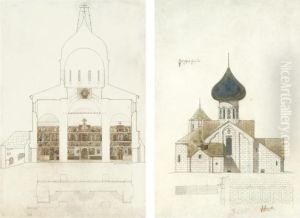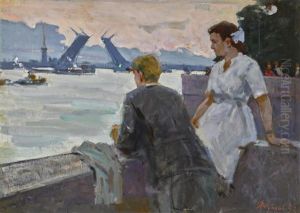Alexei Viktorovich Schusev Paintings
Alexei Viktorovich Schusev was a prominent Russian and Soviet architect whose career spanned from the late Tsarist period through the Soviet era, leaving a lasting impact on the architectural landscape of Russia and beyond. Born on October 8, 1873, in Chișinău, which was then part of the Russian Empire and is now in Moldova, Schusev demonstrated an early interest in architecture that led him to study at the Imperial Academy of Arts in Saint Petersburg, graduating in 1897. His education and talent set the stage for a prolific career that would blend traditional Russian architectural styles with emerging modernist trends.
Schusev's work is characterized by a versatility that allowed him to navigate the changing political and cultural landscapes of early 20th-century Russia. Initially, he gained recognition for his work on restoration projects of ancient Russian churches and monasteries, which showcased his deep respect for Russia's architectural heritage and his skill in historical research. This period of his career was marked by projects such as the restoration of the Kazan Cathedral in Moscow and the Marfo-Mariinsky Convent, reflecting a dedication to reviving Russia's past glory through architecture.
However, Schusev's legacy is perhaps most famously tied to his role in Soviet architecture, where he adapted to the new regime's ideological demands without sacrificing his artistic integrity. His most iconic project from this era is the Lenin Mausoleum in Moscow's Red Square, designed in 1924. This structure, a monumental testament to the Soviet Union's founder, Vladimir Lenin, combines elements of modernism with the monumentalism that would come to define Soviet architecture. The Mausoleum's design demonstrates Schusev's ability to create symbolic architecture that resonated with the Soviet state's objectives while maintaining a unique artistic vision.
Throughout the 1930s and 1940s, Schusev continued to work on significant projects, including leading roles in the planning and construction of the Moscow Metro and various other public and residential buildings that contributed to the transformation of the Soviet architectural landscape. His work during this period reflected the broader trends of Socialist Realism and contributed to the shaping of a new architectural identity for the Soviet Union.
Alexei Viktorovich Schusev passed away on May 24, 1949, in Moscow, leaving behind a rich legacy that spans the divide between pre-revolutionary and Soviet Russia. His contributions to architecture are remembered for their historical significance, their artistic beauty, and their embodiment of the tumultuous transitions his country experienced. Schusev's career is a testament to the power of architecture to reflect and influence the course of history, earning him a place among the most influential architects of the 20th century.

